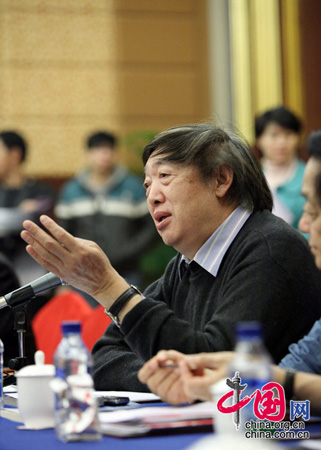Famous writer warns China against 'Great Cultural Leap'
- By Wu Jin
 0 Comment(s)
0 Comment(s) Print
Print E-mail China.org.cn, March 12, 2012
E-mail China.org.cn, March 12, 2012
Despite China's growing eagerness to boost its culture, native experts threw cold water on the frenetic campaigns characterized by bland slogans and widespread replicas of old buildings (as most of their original ones have been demolished for commercial use).
|
Chinese reputable writer Feng Jicai gives speech at a press conference of the Chinese People's Political Consultative Conference on Mar. 8. [China.org.cn] |
As a counselor to the country's State Council, Feng said China should be particularly cautious of the reemergence of the "Great Leap" in cultures.
The "Great Leap (Forward)" was an economic and social campaign in the early 1960s, aiming at transforming China from an agrarian society into an industrialized country. The movement later proved to be a failure followed by a three-year natural disaster that severely affected the country's economy.
The "Great Leap" ended some 40 to 50 years ago, but its impact seems to linger on. In an imperceptible way, it is filtering down into the cultural field with omnipresent swanky projects.
Acres of lands have been tagged across the country for the establishment of cultural innovation centers. According to Feng, these cultural zones are nothing but profit-driven machines.
"The spiritual world can neither be constructed nor produced," Feng said, "if you ask me to spend three years creating an everlasting love with my wife, I would say that I have no such ability."
As one of the staff working for the Chinese Cultural Heritage Protection, Feng has seen numerous old things being crushed under the rumbling assembly lines and bulldozers. Handcrafts, like paper-cutting and shadow-play, are now machine-made; old buildings are being demolished and historic sites have been trampled by the constant tourist crowds.
Urban construction keeps eroding the heritage of the past. Just two months ago, a real estate developer pulled down the former residence of the late renowned Chinese architect Liang Sicheng and his wife Phyllis Lin, erasing the last few traces of the famous couple's efforts to preserve China's traditional buildings. Later, the developer said the tearing down of the building was for the purpose of safety, and the courtyard would be rebuilt based on its original look.







Go to Forum >>0 Comment(s)